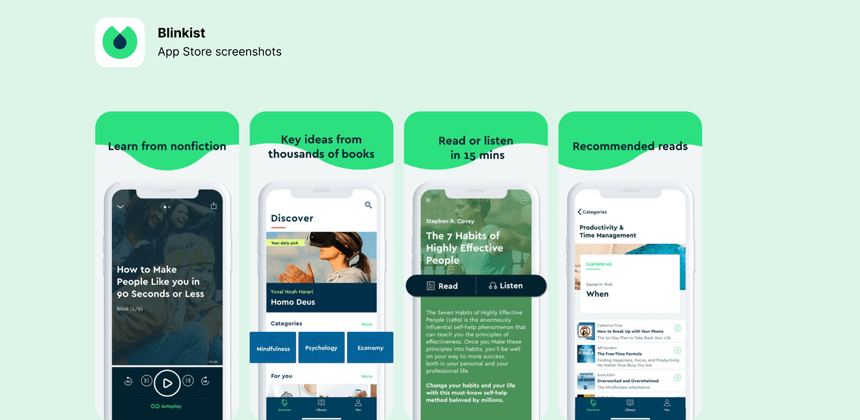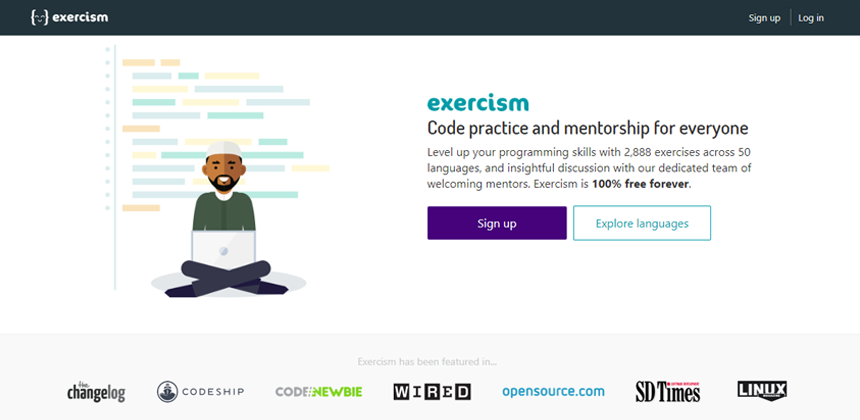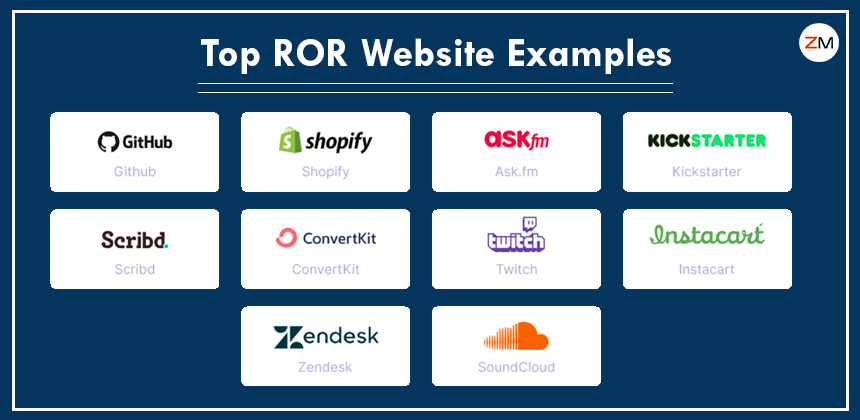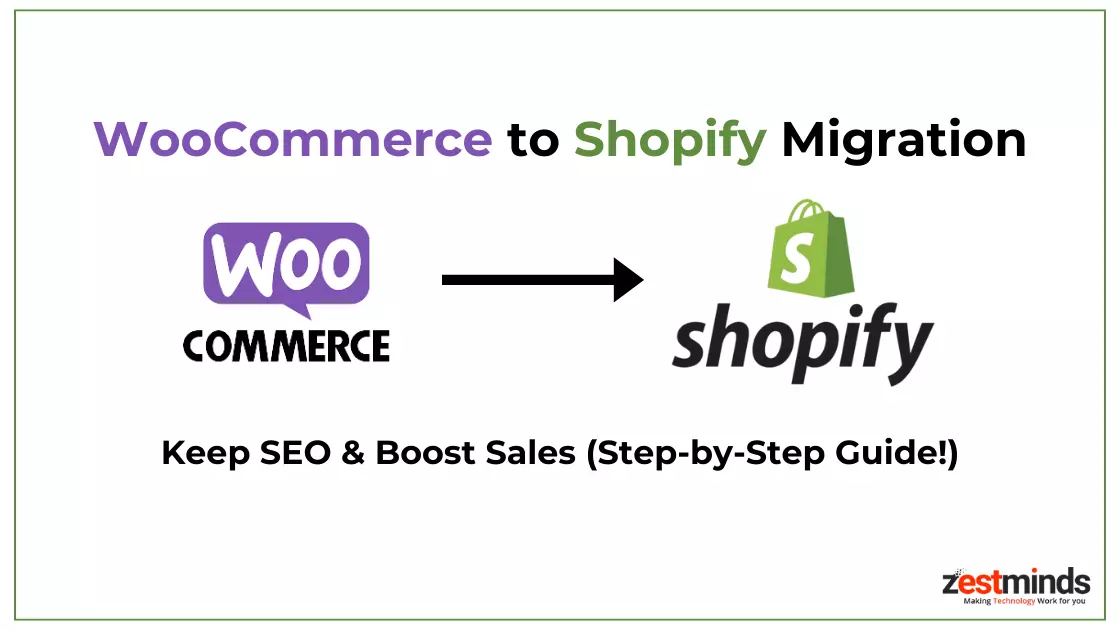Ruby on Rails is a popular choice for web development frameworks. It enables diversity, scalability, and rapid prototyping. Ruby on Rails can decrease web application development time by 25 to 40 percent. In order to build their applications, some of the greatest companies use Ruby on Rails development services.











 Blinkist
Blinkist is an online service for reading more books in less time, or "books-in-blinks" as the platform describes them. Blinkist is constructed using Ruby on Rails. It includes abridged versions of more than 3,000 bestsellers from all genres. The commercial edition allows users to read without restrictions, even offline, send their readings to Kindle, and synchronize with Evernote, among other features. Users have daily access to one preselected reading with the free version. One book-in-a-blink can be read in as little as 15 minutes and is accompanied by an audio track. Currently, 10 million individuals are using Blinkist to read. The service cannot replace reading entire books, but it is an excellent method to discover new books, writers, and concepts.
Blinkist
Blinkist is an online service for reading more books in less time, or "books-in-blinks" as the platform describes them. Blinkist is constructed using Ruby on Rails. It includes abridged versions of more than 3,000 bestsellers from all genres. The commercial edition allows users to read without restrictions, even offline, send their readings to Kindle, and synchronize with Evernote, among other features. Users have daily access to one preselected reading with the free version. One book-in-a-blink can be read in as little as 15 minutes and is accompanied by an audio track. Currently, 10 million individuals are using Blinkist to read. The service cannot replace reading entire books, but it is an excellent method to discover new books, writers, and concepts.
 Dribbble
The designer's social network is Dribbble. The primary characteristic of this service is that users may only exchange short photos of designs and software. In addition, users can subscribe to get updates from a specific designer, comment on and like posts (photos), etc. Dribbble is a typical social network in terms of functionality, with a news feed, comments, voting, and tags. This is an endless source of inspiration.
Codecademy
Codecademy is one of the most popular programming course providers. Lessons teach students how to construct simple functions and create increasingly complex applications over time. Codecademy's simplicity, interaction, and gamified learning system make it appealing. The service offers both free and subscription-based courses. The premium option provides live support, individualized study strategies, and practical assignments. Codecademy has helped more than 45 million people worldwide since its inception.
Dribbble
The designer's social network is Dribbble. The primary characteristic of this service is that users may only exchange short photos of designs and software. In addition, users can subscribe to get updates from a specific designer, comment on and like posts (photos), etc. Dribbble is a typical social network in terms of functionality, with a news feed, comments, voting, and tags. This is an endless source of inspiration.
Codecademy
Codecademy is one of the most popular programming course providers. Lessons teach students how to construct simple functions and create increasingly complex applications over time. Codecademy's simplicity, interaction, and gamified learning system make it appealing. The service offers both free and subscription-based courses. The premium option provides live support, individualized study strategies, and practical assignments. Codecademy has helped more than 45 million people worldwide since its inception.
 Exercism.io
Exercism.io is another programming language-learning portal. This one is remarkable because it is completely free. Katarina Owen, the platform's director, established Exercism.io in 2013 while teaching programming in order to provide her students with feedback on assignments. There are now over 50 programming languages available for study at Exercism, which has increased in popularity. Users can become mentors or maintainers and report issues on GitHub to contribute to the project.
Treehouse
Treehouse is an American online programming school that was started in 2011. Individuals and teams can take programming and design courses ranging from beginner to advanced levels. Treehouse asserts that its introductory courses can assist students to obtain entry-level employment. During the course of their studies, students receive weekly live mentorship and assistance through the platform's Slack community. Treehouse also offers on-demand training for teams seeking to increase their skills and grasp the newest trends. Its professionalism is demonstrated by the fact that many customers grade the school highly and corporations such as Twitter, Airbnb, and AOL use the platform.
Exercism.io
Exercism.io is another programming language-learning portal. This one is remarkable because it is completely free. Katarina Owen, the platform's director, established Exercism.io in 2013 while teaching programming in order to provide her students with feedback on assignments. There are now over 50 programming languages available for study at Exercism, which has increased in popularity. Users can become mentors or maintainers and report issues on GitHub to contribute to the project.
Treehouse
Treehouse is an American online programming school that was started in 2011. Individuals and teams can take programming and design courses ranging from beginner to advanced levels. Treehouse asserts that its introductory courses can assist students to obtain entry-level employment. During the course of their studies, students receive weekly live mentorship and assistance through the platform's Slack community. Treehouse also offers on-demand training for teams seeking to increase their skills and grasp the newest trends. Its professionalism is demonstrated by the fact that many customers grade the school highly and corporations such as Twitter, Airbnb, and AOL use the platform.

What is Ruby on Rails?
Ruby is a dynamic, interpreted, general-purpose language for object-oriented programming. Ruby code is so human-like and similar to English that even non-programmers can understand it to some extent. However, developing new applications with Ruby alone is a laborious process. To streamline the development process, Rails, a specialized tool, was developed. Rails is a Ruby-based web development framework that was introduced nine years after Ruby's initial release. It was intended to simplify the programming of web applications, facilitating the creation of websites of any complexity. It also marked the beginning of Ruby's tremendous popularity and the entrance of Ruby on Rails firms, including ourselves, that recognized its potential.What is Ruby on Rails used for and why it’s so popular?
Why should you select Ruby on Rails? Ruby's primary purpose is to rapidly construct new high-performance web platforms. Ruby, as a general-purpose programming language, is suited for a wide variety of programming jobs, hence there is no definitive answer to the question of what Ruby is used for. No web development company would consider code to exist outside of the project's business objectives. Each programming language and the technology stack is intended to address certain issues. Therefore, depending on the objective, RoR may or may not be the best option for your online project (but rather yes than no). Ruby on Rails can be used for the following types of projects:-
• Online stores with sophisticated features, such as e-commerce.
• Informational portals.
• Stock exchange platforms.
• Dating websites and web platforms.
• Social networks.
• Non-standard complex projects.
• SaaS-solutions.
Companies using Ruby on Rails
Ruby on Rails is one of the most popular technologies among startups, but it has attracted many top-tier companies, as well. Basecamp, Shopify, Airbnb, Goodreads, Kickstarter, and Hulu, among others, are among the companies that use Ruby on Rails. In other words, you can confidently describe Rails as "business-ready." This article examines 12 popular websites developed with Ruby on Rails. If you are considering to hire a Ruby on Rails software development business, this list will convince you of its effectiveness.Ecommerce Platforms

Shopify
Shopify is an amazing example of a complicated, well-structured, and user-friendly Ruby on Rails eCommerce platform. And it is really wonderful. In a nutshell, it is a software-as-a-service (SaaS) platform that enables entrepreneurs to construct a secure online store with a wide variety of features and choose from approximately 100 payment channels. It is possible for advanced users to modify design templates. Shopify claims that over 820,000 sellers are presently utilizing the service. The expected profit for 2018 is $1,073 million.Gumroad
Gumroad is a website for selling self-made digital material, such as music, photographs, books, and video lessons. The service is straightforward for users. Simply connect with Facebook or Twitter, enter a link to any sort of content (or upload it), set a price, and obtain a link that can be used on any other website. In 2018, more than 45,000 vendors on Gumroad made around $204 million.Service Marketplaces

Airbnb
Airbnb is the largest reservation service for private property owners in the world. Rentals include rooms, flats, mansions, and even garden tents. The service originated when two students who could not afford to house hired a room with an air mattress. Airbnb literally means "airbed and breakfast." The website is designed with Ruby on Rails and is being continually developed, providing users with an intuitive interface and the possibility to pay directly through the service. Anyone who registers with Airbnb can rent out their flat or book accommodations for forthcoming trips. Airbnb currently has over 6 million listings in 190 countries.
Couchsurfing
Couchsurfing is an alternative to Airbnb for travelers looking to save money on lodging. Ruby and the Ruby on Rails web framework are used to creating the website. It was started in 2003 by ardent travelers and has a current audience of over 400 thousand hosts and 15 million travelers. The concept is that a traveler can stay for free with a host on their couch (or sometimes in a separate room). You should not expect a luxurious room in exchange for a free stay, but you may use the reviews of previous guests to determine whether the host is courteous and trustworthy. To ensure compatibility, you can communicate with your potential host online. As a result of the platform's expansion, its owners have chosen to charge $60 for verification. Users with verified status can request a place to stay and send an unlimited number of messages. Although hosts are not permitted to charge, guests should not arrive empty-handed and should be courteous and clean. Couchsurfing not only provides opportunities to travel cheaply but also to make new friends around the world.
Fiverr
Fiverr is a global freelance marketplace where clients may acquire economical web design, content writing, and programming, among other things. Fiverr was formed in Tel Aviv, Israel in 2010 and derived its name from the fact that minor projects may be completed for $5. For orders under $20, consumers are charged $1; for orders over $20, they are charged 5% of the total amount. Sellers are charged 20% of the entire order amount. Currently, the platform is the frontrunner among freelance platforms.Crowdfunding Platforms

Kickstarter
Most people are familiar with Kickstarter, an independent microfinancing platform. According to its developers, Kickstarter is a crowdfunding website that enables small businesses to undertake ambitious projects. Kickstarter employs a complex microfinancing mechanism integrated with a social network. But instead of likes, users have the option to contribute a little sum of money to good projects. In 2009, Ruby on Rails was used to create Kickstarter, which annually raises tens of millions of dollars for global initiatives, including various forms of web development. The Kickstarter interface is intuitive and easy to use, and its key features are exploited in an appropriate manner. The integration of payment systems delivers added value.
Indiegogo
Indiegogo is a website for crowdsourcing founded on the ideas of openness, transparency, and freedom of action and choice. This initiative was created in 2008 and is Kickstarter's predecessor. Later, it expanded to many industries and became the first global crowdfunding site. Indiegogo finances unrestrictedly any initiatives in whole or in part. The projects may be technological (even without a prototype), entertaining, educational, or charitable.
AngelList
AngelList is a platform for networking that connects companies with investors, talent, and customers. It was founded in the United States in 2010 by Naval Ravikant and Babak Nivi. The company does not charge startups a fee for helping them raise funding. There are just fees and commissions for investors and returns on investments made through the site. In 2018, AngelList announced that they have assisted around 2 million individuals in securing startup positions over the previous two years. In 2018, almost 75 percent of firms that received funding from U.S. investors did so through AngelList. This service is an excellent illustration of how Rails not only suits startup development but also contributes to the growth and prosperity of startup communities.Software Development and Management Platforms

Basecamp
Popular project management service Basecamp was likewise built on Ruby on Rails. In reality, the Ruby on Rails framework was developed alongside this project. Ruby on Rails has undergone continuous development since its 2004 release: developers enable access to APIs, support mobile clients, and present widgets and plugins for integration with third-party products. Basecamp's ease of use and straightforward interface, connectivity with prominent software development platforms, and ability to construct bespoke add-ons are among its chief advantages. Each Basecamp project offers tools for setting up a discussion, adding text or other documents, and managing a calendar and task list. In recent years, numerous Basecamp rivals have emerged, yet few clients have abandoned the platform. On the contrary, both the quantity and quality of initiatives are rising steadily. There are currently over 3 million active Basecamp accounts.
GitHub
Notable is the fact that GitHub, one of the most popular programming services today, is likewise written in Ruby and uses the Ruby on Rails framework. Developers utilize GitHub to share their projects, collaborate on development, and manage version histories. On GitHub, every user can establish a repository to store and share a project with others. Collaborators are able to see project files and source code with syntax highlighting, download the archetype, or modify it. Membership on GitHub enables participation in a range of open-source projects. Today, millions of individuals utilize GitHub.
GitLab
GitLab is a single application that encompasses the whole DevOps lifecycle, allowing the complete development team to manage projects and collaborate on code. As GitLab cofounder Dmitry Zaporozhets was inspired by GitHub, he picked Ruby on Rails for its development. GitLab's CEO, Sid Sijbrandij, notes that the Ruby on Rails environment allows for the development of plenty of high-quality features. GitLab is the leader in the Git industry because it hosts repositories for over 100,000 users.
Heroku
Using Heroku, you can develop web applications in eight programming languages (including Ruby) and host them in the cloud (PaaS). A Ruby on Rails core and interface power the website. In contrast to having to create solutions from scratch, users can concentrate on development. In 2008, with $20,000 in funding, the founders of Heroku began developing the platform. Heroku is a touch more expensive than its competitors, but consumers give it nine out of ten stars for its quick deployment, extensive toolset, friendly community, and incredible price-to-quality ratio.Online libraries
Scribd The service Scribd stores digital documents. It was founded in 2006 as a collection of scholarly publications and a mechanism for the viral dissemination of presentations. Now, it includes best-selling novels, audiobooks, music, magazines, ebooks, and more. The concept is intended for conservative users who view the Internet not as a "new universe," but as an updated library. Scribd is currently a fully functional social network. Its interface has a suitable amount of communication tools for its consumers. Anyone can subscribe to a specific author and view other users' documents (which can be submitted for free) via search or news feeds. There are avatars, contacts, biographies, rankings, statistics, and suggestions on Scribd. After a free 30-day trial, users are charged $8.99 per month for a membership. Blinkist
Blinkist is an online service for reading more books in less time, or "books-in-blinks" as the platform describes them. Blinkist is constructed using Ruby on Rails. It includes abridged versions of more than 3,000 bestsellers from all genres. The commercial edition allows users to read without restrictions, even offline, send their readings to Kindle, and synchronize with Evernote, among other features. Users have daily access to one preselected reading with the free version. One book-in-a-blink can be read in as little as 15 minutes and is accompanied by an audio track. Currently, 10 million individuals are using Blinkist to read. The service cannot replace reading entire books, but it is an excellent method to discover new books, writers, and concepts.
Blinkist
Blinkist is an online service for reading more books in less time, or "books-in-blinks" as the platform describes them. Blinkist is constructed using Ruby on Rails. It includes abridged versions of more than 3,000 bestsellers from all genres. The commercial edition allows users to read without restrictions, even offline, send their readings to Kindle, and synchronize with Evernote, among other features. Users have daily access to one preselected reading with the free version. One book-in-a-blink can be read in as little as 15 minutes and is accompanied by an audio track. Currently, 10 million individuals are using Blinkist to read. The service cannot replace reading entire books, but it is an excellent method to discover new books, writers, and concepts.
Educational & Networking Platforms
 Dribbble
The designer's social network is Dribbble. The primary characteristic of this service is that users may only exchange short photos of designs and software. In addition, users can subscribe to get updates from a specific designer, comment on and like posts (photos), etc. Dribbble is a typical social network in terms of functionality, with a news feed, comments, voting, and tags. This is an endless source of inspiration.
Codecademy
Codecademy is one of the most popular programming course providers. Lessons teach students how to construct simple functions and create increasingly complex applications over time. Codecademy's simplicity, interaction, and gamified learning system make it appealing. The service offers both free and subscription-based courses. The premium option provides live support, individualized study strategies, and practical assignments. Codecademy has helped more than 45 million people worldwide since its inception.
Dribbble
The designer's social network is Dribbble. The primary characteristic of this service is that users may only exchange short photos of designs and software. In addition, users can subscribe to get updates from a specific designer, comment on and like posts (photos), etc. Dribbble is a typical social network in terms of functionality, with a news feed, comments, voting, and tags. This is an endless source of inspiration.
Codecademy
Codecademy is one of the most popular programming course providers. Lessons teach students how to construct simple functions and create increasingly complex applications over time. Codecademy's simplicity, interaction, and gamified learning system make it appealing. The service offers both free and subscription-based courses. The premium option provides live support, individualized study strategies, and practical assignments. Codecademy has helped more than 45 million people worldwide since its inception.
 Exercism.io
Exercism.io is another programming language-learning portal. This one is remarkable because it is completely free. Katarina Owen, the platform's director, established Exercism.io in 2013 while teaching programming in order to provide her students with feedback on assignments. There are now over 50 programming languages available for study at Exercism, which has increased in popularity. Users can become mentors or maintainers and report issues on GitHub to contribute to the project.
Treehouse
Treehouse is an American online programming school that was started in 2011. Individuals and teams can take programming and design courses ranging from beginner to advanced levels. Treehouse asserts that its introductory courses can assist students to obtain entry-level employment. During the course of their studies, students receive weekly live mentorship and assistance through the platform's Slack community. Treehouse also offers on-demand training for teams seeking to increase their skills and grasp the newest trends. Its professionalism is demonstrated by the fact that many customers grade the school highly and corporations such as Twitter, Airbnb, and AOL use the platform.
Exercism.io
Exercism.io is another programming language-learning portal. This one is remarkable because it is completely free. Katarina Owen, the platform's director, established Exercism.io in 2013 while teaching programming in order to provide her students with feedback on assignments. There are now over 50 programming languages available for study at Exercism, which has increased in popularity. Users can become mentors or maintainers and report issues on GitHub to contribute to the project.
Treehouse
Treehouse is an American online programming school that was started in 2011. Individuals and teams can take programming and design courses ranging from beginner to advanced levels. Treehouse asserts that its introductory courses can assist students to obtain entry-level employment. During the course of their studies, students receive weekly live mentorship and assistance through the platform's Slack community. Treehouse also offers on-demand training for teams seeking to increase their skills and grasp the newest trends. Its professionalism is demonstrated by the fact that many customers grade the school highly and corporations such as Twitter, Airbnb, and AOL use the platform.
Wrapping up
As can be seen, many well-known organizations from a variety of industries, such as online education, travel, crowdfunding, and eCommerce, select Ruby on Rails due to the following reasons:-
• It reduces development time by providing numerous ready-made solutions (Ruby gems) for common development activities, such as authorizing and authenticating users and verifying code quality. Therefore, it is an excellent option for startups and MVPs.
• Rails scales horizontally, so you don’t have to worry if your web application grows. With Rails, you can separate it into chunks, move data to side servers, and add more features without losing speed and quality.
• Ruby on Rails code is readable and aesthetically pleasing, with a preference for convention over configuration.
• Finally, Ruby on Rails is secure due to the framework's built-in security mechanisms.


Shivam Sharma
About the Author
With over 13 years of experience in software development, I am the Founder, Director, and CTO of Zestminds, an IT agency specializing in custom software solutions, AI innovation, and digital transformation. I lead a team of skilled engineers, helping businesses streamline processes, optimize performance, and achieve growth through scalable web and mobile applications, AI integration, and automation.





